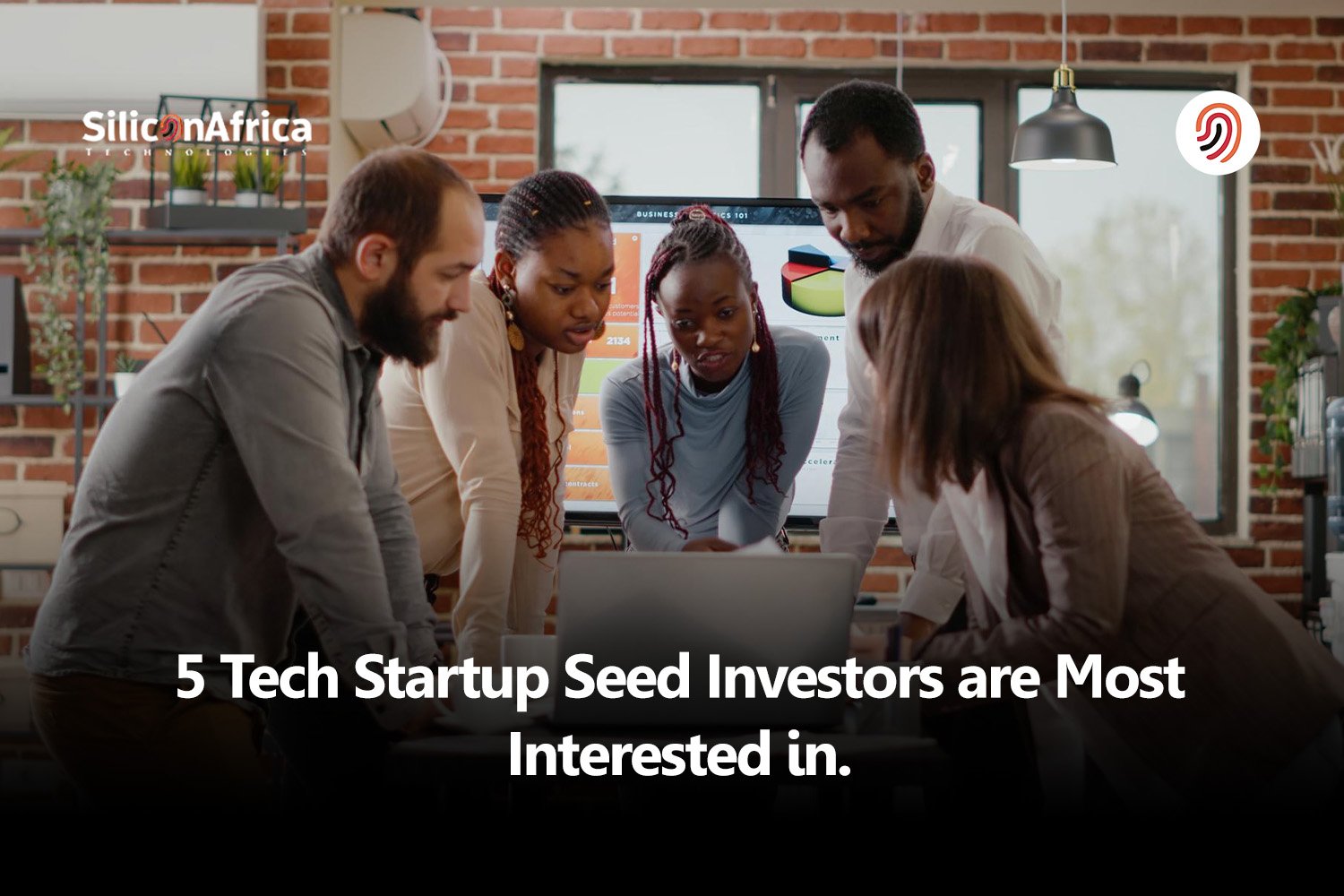Newsletter Subscribe
Enter your email address below and subscribe to our newsletter

Seed investment is when early-stage startups receive their first round of funding to kickstart their journey. In the world of technology, seed investors give tech startups a little push to get going.

Seed-stage funding is crucial because it helps startups cover their initial costs, like making their product or doing market research. It’s like giving them the fuel they need to start their engine.
In this article, we’ll explore the top tech startups most seed investors are interested in. We will also explore what seed investment is all about and why it’s crucial for startups. Let’s get started.
From the viewpoint of a startup, seed investment marks the initial formal backing acquired during the early phases of development.
Typically, this investment entails equity-based financing, wherein founders secure capital in return for a share of ownership in their venture.
To start with, seed-stage funding means getting money to kickstart a startup’s early days. It’s the first round of funding a startup gets that helps cover initial expenses like making the product, doing market research, and other business costs.
Seed-stage funding is essential because it gets startups going and helps them start making money. It also lets startups test if their business idea works and if people want their product or service.
Moreover, it gives them money to hire people, build their brand, and grow their business.
There are different ways to get seed-stage funding, like from angel investors, venture capitalists, or crowdfunding. But the main thing for startups to remember is that seed-stage funding is just the beginning.
To attract investors and keep growing, startups need a solid business plan and a great team.
When talking about seed capital investment, certain types of tech startups catch the eye of investors more often. Tech startups are appealing to seed capital investors because they can grow and expand quickly.
These startups usually make new software, gadgets, or online platforms. They might change how things work in industries or even create brand-new markets.
Let’s explore some of the most attractive types of tech startups for seed capital investors.
Biotech startups work on creating new and revolutionary medical treatments, drugs, or devices. They need a lot of money to do research, run tests, and get approval from regulators.
But if they succeed, biotech startups can make a lot of money, which is why seed capital investors like them.
SaaS startups are businesses that provide software as a service. Instead of selling software to use forever, they offer it as a subscription, like Netflix for software.
These startups are attracting investors because they’re changing how businesses and individuals access software.
With SaaS, people can use powerful tools without needing to buy or install anything. It’s all online, making it convenient and cost-effective.
SaaS startups are reshaping industries by offering innovative solutions for everything from project management to accounting.
As more businesses move to the cloud, SaaS startups are becoming a big deal in the tech world.
EdTech startups are companies that use technology to help people learn. They create apps, websites, or other tools to make learning easier and more fun.
EdTech startups interest investors because they have the potential to change how we learn and teach.
EdTech startups are becoming increasingly important. With technology becoming more and more a part of our lives, students learn in new ways, making education accessible to more people, and shaping the future of learning.
Fintech startups use technology to change how banking, payments, lending, and investing work. They attract seed capital investors because they can shake up a big, regulated industry.
These financial tech startups tend to expand fast. Plus, investors can recoup their money on time.
Transactions are now happening online. And people are shopping online as well!. This makes an e-commerce startup a goldmine for seed investors.
E-commerce startups work in the fast-growing world of online retail and use technology to make shopping easy for customers.
Here are some types of investors you could talk to for your startup. Once you figure out who to pitch to, it’s all about making your pitch deck good to get your funding round done:
The first people entrepreneurs should ask for investment from are friends, family, and people they’re close to.
At this point, there’s not much solid proof to convince investors. They’re backing your idea and, more importantly, you. These are the folks who know you well, trust you, and believe in you the most.
They might not give a huge amount, maybe from $1,000 to $200,000. But if you can’t get support from them, other investors might wonder why.
Professional angel investors are often sought after for seed rounds and beyond. They’re open to funding smaller ventures compared to venture capitalists (VCs), and they might offer more flexible terms. Plus, they bring valuable insights and connections.
You can connect with angel investors in various ways: online, at pitch events, or through introductions from fellow startup founders.
Venture capitalists are key players in funding tech startups. They’re experienced investors who invest in small, fast-growing companies in exchange for a stake.
They focus on startups in their early stages, looking for those with the potential for big profits through quick growth.
Venture capitalists not only invest money but also provide advice and may join the startup’s board.
You’ll mostly find them in tech hubs, interested in startups with innovative tech or the ability to disrupt industries.
Corporate investors are big companies with lots of money to invest. They’re not as scared of risks because they can handle losing money on some investments.
These investors usually put their money into tech startups that match their business interests. For example, a software company might invest in a startup making new software.
They like tech startups because they bring new ideas and tech. If a startup has a great idea, a corporate investor might want to buy it to get its technology.
But corporate investors can be a bit impatient. They might want to see results fast, and if they don’t, they might take their money back from the startup.
Accelerators and incubators are programs that help new startups in different ways.
Startups get some money, learn from mentors, and join workshops. In the end, they pitch their ideas to investors.
Incubators are longer programs, up to 2 years. Startups get more help from experienced business people and have a place to work. Unlike accelerators, there’s no rush to leave.
Both accelerators and incubators are good for tech startups. They give startups what they need to grow their businesses.
Crowdfunding is a way for startups to raise money by asking a large number of people for small investments. In return, investors may receive rewards or equity in the company.
There are different types of crowdfunding, including donation-based, reward-based, and equity-based crowdfunding. It’s often done through online platforms, making it accessible to a wide audience.
High-net-worth individuals (HNWIs) are people with over $1 million in investable assets. They’re an important group for tech startups looking for funding because they have the money to make big investments.
HNWIs usually invest through venture capital firms, but they can also invest directly in startups. Many of them used to be entrepreneurs, so they know a lot about startups.
Some famous HNWIs who invested in tech startups are Peter Thiel from PayPal, Marc Andreessen from Netscape, and Reid Hoffman from LinkedIn.
Banks and government agencies can offer funding, but they’re not like typical investors. Banks might not be keen on giving money to early-stage startups, but they might offer credit cards or loans as your business grows.
Government programs might have grants, but they’re hard to get. Loans from banks or governments need to be paid back, usually when you need money.
Even though they don’t take a share of your company, they can affect how much money you make, which might make it harder to get other investors later.
Government programs often have strict rules, so founders should know what they’re getting into.
Investing in a startup can be risky, and that’s why investors look out for certain qualities in every business opportunity before offering their cash.
For you, ensuring these qualities are in place will give you a competitive advantage in your seed funding stage.
Passion: This means being excited about your project and where you want it to go. What investors want to see is proof that you’ve put in money and made sacrifices for your idea.
Traction: Investors need to see that your idea works. You can do this by showing them a basic version of your product that proves people want it, even if it’s not perfect.
Big market: Investors want to see that there are lots of people who might buy your product. They won’t be interested if only a few people might want it.
Competitive edge: You need to explain why your product is better than what’s already out there. It’s not enough to say you’ll work harder—you need to show how things like where you are or your unique skills give you an advantage.
Team: Investors want to see that your business doesn’t rely too much on just one person. They like to see a team that works well together and can handle different jobs.
If you’re looking for seed-stage investors for your startup, here’s what you should do:
In conclusion, seed investors in tech startups are most interested in companies that show potential for rapid growth and innovation. They look for startups in sectors like technology, consumer products, healthcare, and fintech.
These startups typically have strong market traction, a large addressable market, a competitive edge, a solid team, and a clear exit strategy.
By focusing on these vital areas, tech startups can attract seed investors and set themselves up for success in the competitive startup landscape.
Bfree, a Nigerian Startup that Helps Lenders Recover Debt without Debt-shaming, gets $3M Funding
Moniepoint: From a Small Startup to an Online Payment Giant
Chowdeck: a Closer Look into the Fast Growth of the Food Delivery Startup 2024